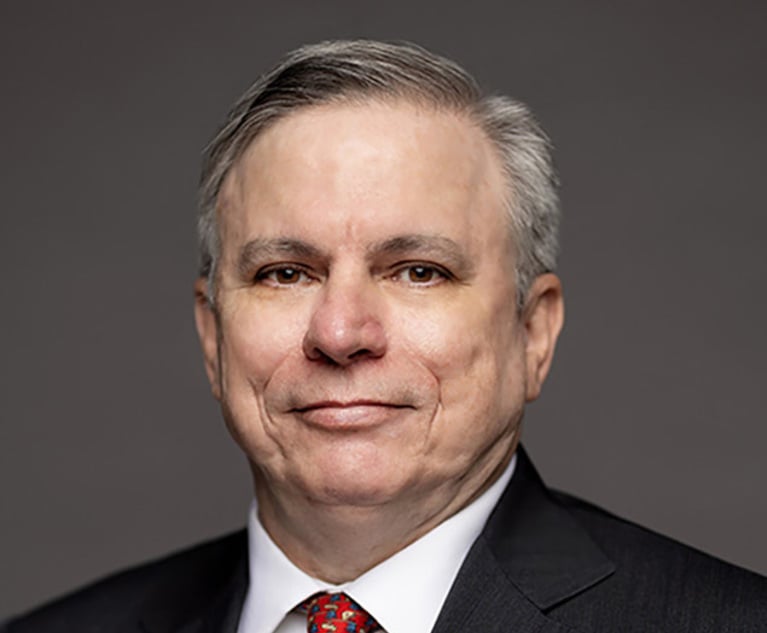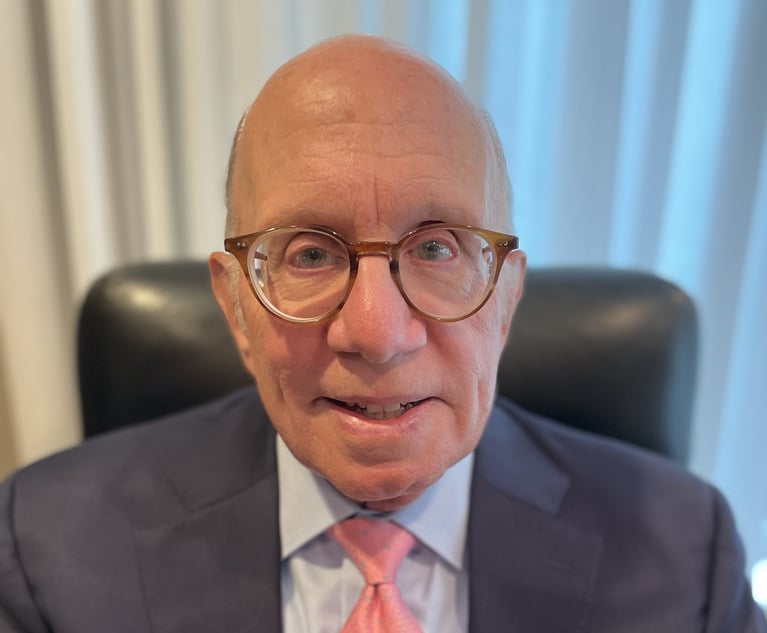 Attorney Alan Dershowitz talks to the press outside the Southern District courthouse in New York, Monday, Dec. 2, 2019. Photo: Richard Drew/AP
Attorney Alan Dershowitz talks to the press outside the Southern District courthouse in New York, Monday, Dec. 2, 2019. Photo: Richard Drew/APConsidering Dershowitz's Role(s)
Why did Trump deserve Dershowitz's creativity? Why do the positions that Trump wanted taken deserve to have been argued by someone who, as a result of his Trump advocacy, has somewhat squandered all the valuable things he's done for many years for defendants who might not otherwise have someone of Dershowitz's caliber at bat for them?
February 14, 2020 at 10:00 AM
6 minute read
Alan Dershowitz's slender new volume, "Defending The Constitution" (Hot Books, 2020), published and distributed on February 5—the very day President Trump was acquitted in the Senate—largely consists of his verbatim argument on the president's behalf before the Senate. In his introduction, Dershowitz tells us in exquisite detail how the president, at a dining room table at Mar-a-Lago, managed to persuade Dershowitz's wife, initially opposed to Dershowitz formally joining the president's defense team before the Senate, to let him join. As many see it—I'm sorry, Alan—she probably should have stuck to her guns.
Yes, Dershowitz did publicly confirm, albeit late in the game, that President Trump had brought him onto his defense team. Many believed that the noted professor had been on that team long before. Dershowitz has always said no. Indeed, he has repeatedly said that, as the civil libertarian he has been, through his many writings and TV interviews he was basically doing the same thing he's done throughout his storied career: advocating against injustice wherever it appeared.
And, he argued, whether or not he likes Trump's positions and policies, the president's rights, qua president, were repeatedly violated by the investigations against him by prosecutors and then the Congress. Dershowitz, too, even still, and notwithstanding his clearly having been a member of the Trump defense team, tried, and tries still, to walk the thread-thin tightrope that says he wasn't really representing Trump, but rather constitutional principles. The title of his book even argues that.
Getting inside Professor Dershowitz's head and deciding what has motivated him is beyond my skillset—and there's room for only one of us in there anyway. Maybe it's Dershowitz's love for Israel and his belief, right or wrong, that Trump is a better friend to Israel than anyone else who might occupy the White House. Maybe it's that Dershowitz is simply getting older and, thus, has become more conservative, concluding that the Democrat Party has moved too far left. And perhaps also, like many of us as we age—the writer included—Dershowitz has a continuing need for "relevance."
Personally, I'm disappointed, maybe angered, by Dershowitz's latest incarnation. He has been a genius of sorts over the years. Imaginative, in ways that most advocates aren't. He has oftentimes been the last resort for criminal defendants who have had nowhere to turn when the law has come down hard on them. Stated otherwise, he has been the lawyer willing to take positions that no other lawyers are willing to take, they fearing that their personal or professional reputations might be jeopardized.
But, why did Trump deserve Dershowitz's creativity? Why do the positions that Trump wanted taken deserve to have been argued by someone who, as a result of his Trump advocacy, has somewhat squandered all the valuable things he's done for many years for defendants who might not otherwise have someone of Dershowitz's caliber at bat for them? Why would Dershowitz trivialize his genius with Trump-advocacy positions that seem so far afield from what Dershowitz has stood for all his career—whether or not he argued (which Dershowitz adamantly denies, but as the record suggests) that a president can "do anything" if he believes that his election is in the public interest (the so-called "Dershowitz Doctrine").
I, and most, never minded Dershowitz representing O.J. Simpson or Mike Tyson or, actually, even the Nazis who marched in Skokie—foundational constitutional issues were at stake. No one ever believed, by virtue of his arguing for them, that Dershowitz was defending murder or rape or, especially, neo-Nazism when he so vigorously stood up for these individuals. Everyone knew then that Dershowitz was simply standing up for key constitutional imperatives.
But Trump is different. It seems that Dershowitz, for several years, has been advocating "for Trump," not simply to right the wrongs Trump has suffered (as Dershowitz perceives them) that were perpetrated by Special Counsel Mueller and then by the House Democrats. A legitimate public perception that Dershowitz has essentially enabled, whether he intended to do not, is that Dershowitz himself actually believes in Trump, despite the sometimes awful things said or done by the president.
Yes, every criminal defendant or target deserves to have the best lawyer he can. And, it is generally unfair to judge a criminal lawyer by the clients who have retained him (even though the lawyer had a perfect right to reject them as clients). Dershowitz has been the subject of derision by some, perhaps many, for "defending" Trump in the public eye. Maybe he has, but that's the price one pays for taking unpopular positions—in any walk of life. But isn't that really the problem—has Dershowitz so merged the roles of counsel and public advocate "for justice" that most can't recognize the difference anymore? Is he the attorney at Skokie protecting fundamental constitutional tenets, or merely a follower of Trump?
Lord Brougham, when defining his duty to zealously represent Queen Caroline, famously threatened to reveal secrets about King George IV's personal life that might damage the monarchy when the King was seeking a divorce from the Queen, famously said: "[A]n advocate, in the discharge of his duty, knows but one person in all the world, and that person is his client. To save that client by all means and expedients, and at all hazards and costs to other persons, and, amongst them to himself, is his first and only duty …"
If a lawyer, here Dershowitz, recognizes that doing that duty—if he accepts it as such— may indeed cause him to suffer ignominy in some circles and thereby cause hazard to himself, he's hardly in a position to complain about the consequences of performing it. I suspect, Professor Dershowitz, perhaps the Lord Brougham of his day, knows that as well as anyone!
For me at least, the next time around, I believe that a lawyer who presents as fine a Socratic academic as there has been, should remain an academic in addressing a case or, contrarily, remain a practicing lawyer in advocating for a client. When the lawyer tries to straddle both as was the case here—for example, when changing his view on whether a president is impeachable even if no crime was committed—the required credibility for both endeavors is undermined.
Joel Cohen, a former prosecutor, practices white-collar criminal defense law as Senior Counsel at Stroock & Stroock & Lavan. He is an adjunct professor at both Fordham and Cardozo Law Schools. He is the recent author of "I Swear: The Meaning of an Oath" (Vandeplas Pub. 2019). The views expressed here are the author's and not necessarily those of his firm or their clients.
|This content has been archived. It is available through our partners, LexisNexis® and Bloomberg Law.
To view this content, please continue to their sites.
Not a Lexis Subscriber?
Subscribe Now
Not a Bloomberg Law Subscriber?
Subscribe Now
NOT FOR REPRINT
© 2024 ALM Global, LLC, All Rights Reserved. Request academic re-use from www.copyright.com. All other uses, submit a request to [email protected]. For more information visit Asset & Logo Licensing.
You Might Like
View All
Why Is It Becoming More Difficult for Businesses to Mandate Arbitration of Employment Disputes?
6 minute read
Trending Stories
- 1Gibson Dunn Sued By Crypto Client After Lateral Hire Causes Conflict of Interest
- 2Trump's Solicitor General Expected to 'Flip' Prelogar's Positions at Supreme Court
- 3Pharmacy Lawyers See Promise in NY Regulator's Curbs on PBM Industry
- 4Outgoing USPTO Director Kathi Vidal: ‘We All Want the Country to Be in a Better Place’
- 5Supreme Court Will Review Constitutionality Of FCC's Universal Service Fund
Who Got The Work
Michael G. Bongiorno, Andrew Scott Dulberg and Elizabeth E. Driscoll from Wilmer Cutler Pickering Hale and Dorr have stepped in to represent Symbotic Inc., an A.I.-enabled technology platform that focuses on increasing supply chain efficiency, and other defendants in a pending shareholder derivative lawsuit. The case, filed Oct. 2 in Massachusetts District Court by the Brown Law Firm on behalf of Stephen Austen, accuses certain officers and directors of misleading investors in regard to Symbotic's potential for margin growth by failing to disclose that the company was not equipped to timely deploy its systems or manage expenses through project delays. The case, assigned to U.S. District Judge Nathaniel M. Gorton, is 1:24-cv-12522, Austen v. Cohen et al.
Who Got The Work
Edmund Polubinski and Marie Killmond of Davis Polk & Wardwell have entered appearances for data platform software development company MongoDB and other defendants in a pending shareholder derivative lawsuit. The action, filed Oct. 7 in New York Southern District Court by the Brown Law Firm, accuses the company's directors and/or officers of falsely expressing confidence in the company’s restructuring of its sales incentive plan and downplaying the severity of decreases in its upfront commitments. The case is 1:24-cv-07594, Roy v. Ittycheria et al.
Who Got The Work
Amy O. Bruchs and Kurt F. Ellison of Michael Best & Friedrich have entered appearances for Epic Systems Corp. in a pending employment discrimination lawsuit. The suit was filed Sept. 7 in Wisconsin Western District Court by Levine Eisberner LLC and Siri & Glimstad on behalf of a project manager who claims that he was wrongfully terminated after applying for a religious exemption to the defendant's COVID-19 vaccine mandate. The case, assigned to U.S. Magistrate Judge Anita Marie Boor, is 3:24-cv-00630, Secker, Nathan v. Epic Systems Corporation.
Who Got The Work
David X. Sullivan, Thomas J. Finn and Gregory A. Hall from McCarter & English have entered appearances for Sunrun Installation Services in a pending civil rights lawsuit. The complaint was filed Sept. 4 in Connecticut District Court by attorney Robert M. Berke on behalf of former employee George Edward Steins, who was arrested and charged with employing an unregistered home improvement salesperson. The complaint alleges that had Sunrun informed the Connecticut Department of Consumer Protection that the plaintiff's employment had ended in 2017 and that he no longer held Sunrun's home improvement contractor license, he would not have been hit with charges, which were dismissed in May 2024. The case, assigned to U.S. District Judge Jeffrey A. Meyer, is 3:24-cv-01423, Steins v. Sunrun, Inc. et al.
Who Got The Work
Greenberg Traurig shareholder Joshua L. Raskin has entered an appearance for boohoo.com UK Ltd. in a pending patent infringement lawsuit. The suit, filed Sept. 3 in Texas Eastern District Court by Rozier Hardt McDonough on behalf of Alto Dynamics, asserts five patents related to an online shopping platform. The case, assigned to U.S. District Judge Rodney Gilstrap, is 2:24-cv-00719, Alto Dynamics, LLC v. boohoo.com UK Limited.
Featured Firms
Law Offices of Gary Martin Hays & Associates, P.C.
(470) 294-1674
Law Offices of Mark E. Salomone
(857) 444-6468
Smith & Hassler
(713) 739-1250








